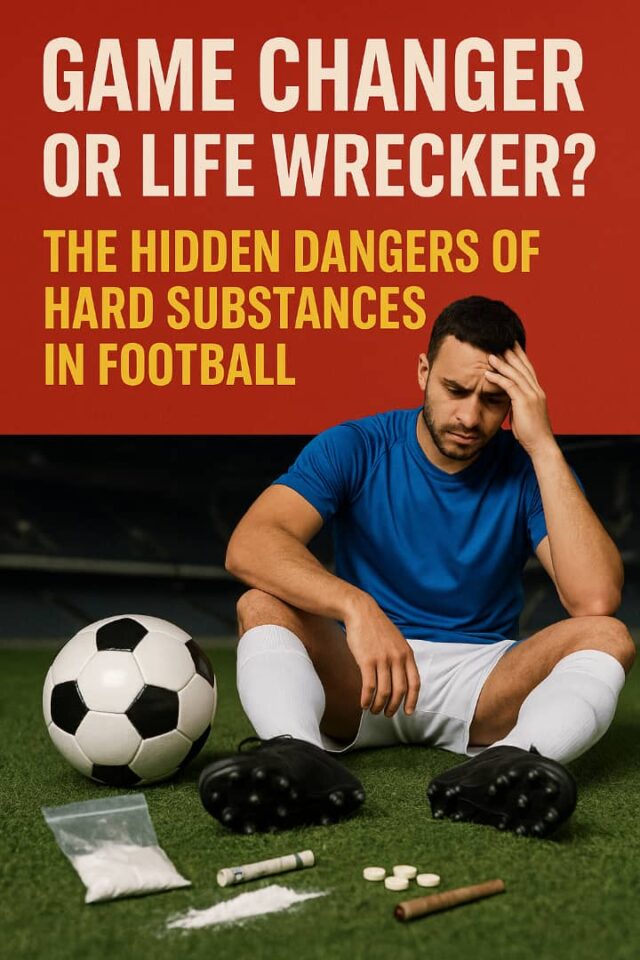Football is more than just a game—it’s a powerful global phenomenon that unites people, fuels dreams, and inspires greatness. But behind the glamor and glory, a darker reality lurks.
The use of hard substances in football is a growing concern that threatens not only the careers of athletes but their health, integrity, and the very spirit of the sport itself.
Read Also: Common Injuries Among Nigerian Football Players: Causes, Prevention, and Treatment
The Dark Side of the Game: The Negative Impact of Hard Substances in Football Settings
Hard substances—ranging from cocaine and heroin to performance-enhancing drugs—have found their way into locker rooms and training grounds, with devastating consequences. The pursuit of peak performance and fast recovery often blinds players to the long-term dangers. While some turn to these substances for endurance or stress relief, the toll they take is enormous.
1. Health Hazards and Decline in Performance
Drug and substance abuse severely impacts physical and mental health. It reduces stamina, impairs coordination, and leads to chronic illnesses like heart disease, liver damage, and mental disorders. Ironically, substances taken to enhance performance often end up destroying the athlete’s abilities over time.
2. Destruction of Reputation and Career
In football, reputation is everything. Being caught with drugs can lead to suspensions, bans, legal issues, and permanent damage to an athlete’s legacy. Once a role model, the drug-using player quickly becomes a cautionary tale.
3. Poor Decision-Making and Increased Risk
Substance abuse clouds judgment and leads to risky behavior—on and off the pitch. This includes aggression, conflict with teammates or officials, and even criminal behavior, which further tarnishes both personal and club reputations.
Beyond the Game: Ethical Implications of Drugs in Football
The ethical concerns around drug use in sports are profound. At its core, doping is a form of cheating. It gives an unfair advantage, undermining the principles of fair play and equal competition. Athletes are role models, and their actions influence millions, especially impressionable youth. When they engage in doping, it sends a dangerous message that success at any cost is acceptable.
Moreover, drug use in sports dehumanizes athletes, turning them into machines rather than celebrating their natural talents and hard-earned skills. It challenges the integrity of the sport and erodes public trust.
Prevention Is the Real Victory: 10 Ways to Curb Drug Abuse in Sports
1. Open Communication: Encourage honest discussions about drugs and their consequences.
2. Active Listening: Understand the pressures athletes face and offer support.
3. Build Self-Confidence: Help athletes value their natural strengths and progress.
4. Strengthen Core Values: Promote discipline, respect, and integrity.
5. Lead by Example: Coaches, staff, and older athletes must model clean behavior.
6. Handle Peer Pressure: Teach athletes how to say no without fear.
7. Promote Healthy Alternatives: Encourage sports, arts, and other positive outlets.
8. Recognize Warning Signs: Be alert to behavioral changes or performance dips.
9. Provide Counseling and Support: Offer access to therapists and rehab when needed.
10. Educate Constantly: Keep athletes informed about the risks and realities of drug use.
Conclusion: Protecting the Spirit of Football
Hard substances have no place in football or any sport. They destroy health, compromise ethics, and damage lives. It’s time to tackle this issue with the same passion and teamwork that define the game. Through education, support, and strict policies, we can preserve the beauty of football—and the lives of those who play it.
For enquires/Consultation
Call- Dr kolade kolapo
+234-7032088130









